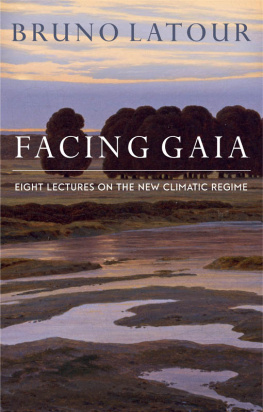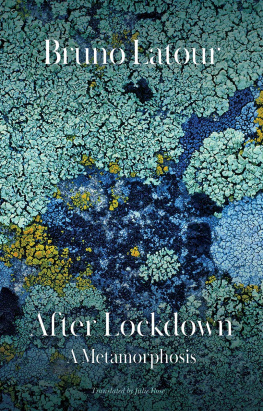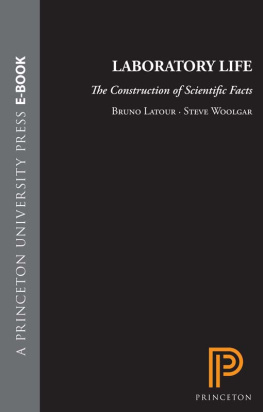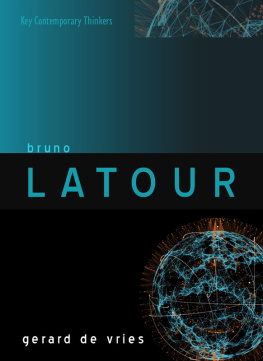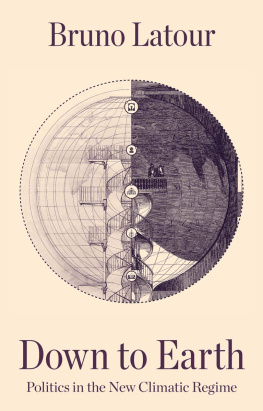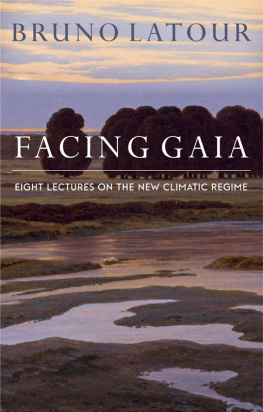Latour - Facing Gaia: eight lectures on the new climate regime / Bruno Latour
Here you can read online Latour - Facing Gaia: eight lectures on the new climate regime / Bruno Latour full text of the book (entire story) in english for free. Download pdf and epub, get meaning, cover and reviews about this ebook. City: Polity, year: 2017, publisher: John Wiley & Sons, Inc.;[United Kingdom, genre: Religion. Description of the work, (preface) as well as reviews are available. Best literature library LitArk.com created for fans of good reading and offers a wide selection of genres:
Romance novel
Science fiction
Adventure
Detective
Science
History
Home and family
Prose
Art
Politics
Computer
Non-fiction
Religion
Business
Children
Humor
Choose a favorite category and find really read worthwhile books. Enjoy immersion in the world of imagination, feel the emotions of the characters or learn something new for yourself, make an fascinating discovery.
Facing Gaia: eight lectures on the new climate regime / Bruno Latour: summary, description and annotation
We offer to read an annotation, description, summary or preface (depends on what the author of the book "Facing Gaia: eight lectures on the new climate regime / Bruno Latour" wrote himself). If you haven't found the necessary information about the book — write in the comments, we will try to find it.
Latour: author's other books
Who wrote Facing Gaia: eight lectures on the new climate regime / Bruno Latour? Find out the surname, the name of the author of the book and a list of all author's works by series.
Facing Gaia: eight lectures on the new climate regime / Bruno Latour — read online for free the complete book (whole text) full work
Below is the text of the book, divided by pages. System saving the place of the last page read, allows you to conveniently read the book "Facing Gaia: eight lectures on the new climate regime / Bruno Latour" online for free, without having to search again every time where you left off. Put a bookmark, and you can go to the page where you finished reading at any time.
Font size:
Interval:
Bookmark:

For Ulysse and Maya

First published in French as Face Gaa. Huit confrences sur le nouveau rgime climatique ditions La Dcouverte, Paris, 2015.
This edition copyright Bruno Latour 2017
The right of Bruno Latour to be identified as Author of this Work has been asserted in accordance with the UK Copyright, Designs and Patents Act 1988.
23 words from p. 186 of James Lovelock, Gaia: The Practical Science of Planetary Medicine (2001) used as an epigraph. Gaia Books Ltd. By permission of Oxford University Press, USA.
First published in English in 2017 by Polity Press
Polity Press
65 Bridge Street
Cambridge CB2 1UR, UK
Polity Press
101 Station Landing
Suite 300,
Medford, MA 02155
USA
All rights reserved. Except for the quotation of short passages for the purpose of criticism and review, no part of this publication may be reproduced, stored in a retrieval system or transmitted, in any form or by any means, electronic, mechanical, photocopying, recording or otherwise, without the prior permission of the publisher.
ISBN-13: 978-0-7456-8433-8
ISBN-13: 978-0-7456-8434-5 (pb)
A catalogue record for this book is available from the British Library.
Library of Congress Cataloging-in-Publication Data
Names: Latour, Bruno, author.
Title: Facing Gaia : eight lectures on the new climatic regime / Bruno Latour.
Description: Cambridge, UK ; Malden, MA : Polity, 2017. | Includes bibliographical references and index.
Identifiers: LCCN 2016057696 (print) | LCCN 2017022305 (ebook) | ISBN 9780745684369 (Mobi) | ISBN 9780745684376 (Epub) | ISBN 9780745684338 (hardback) | ISBN 9780745684345 (paperback)
Subjects: LCSH: Gaia hypothesis. | Philosophy of nature. | Nature in literature. | Climatic changesPhilosophy. | Philosophical anthropology. | NatureEffect of human beings on. | BISAC: SCIENCE / Philosophy & Social Aspects.
Classification: LCC QH331 (ebook) | LCC QH331 .L3313 2017 (print) | DDC 570.1dc23
LC record available at https://lccn.loc.gov/2016057696
Typeset in 10.5 on 12 pt Sabon
by Toppan Best-set Premedia Limited
Printed and bound in the UK by CPI Group (UK) Ltd, Croydon, CR0 4YY
The publisher has used its best endeavours to ensure that the URLs for external websites referred to in this book are correct and active at the time of going to press. However, the publisher has no responsibility for the websites and can make no guarantee that a site will remain live or that the content is or will remain appropriate.
Every effort has been made to trace all copyright holders, but if any have been inadvertently overlooked the publisher will be pleased to include any necessary credits in any subsequent reprint or edition.
For further information on Polity, visit our website:
politybooks.com
In mythical language, the earth became known as mother of law This is what the poet means when he speaks of the infinitely just earth: justissima tellus.
Carl Schmitt
The Nomos of the Earth, 42
It is no longer politics sans phrase that is destiny, but rather climate politics.
Peter Sloterdijk
Spheres, vol. 2, Globes, 333
I would sooner expect to see a goat to succeed as a gardener than expect humans to become responsible stewards of the Earth.
James Lovelock
Gaia: The Practical Science of Planetary Medicine, 186
Nature is but a name for excess.
William James
A Pluralistic Universe, 148
It all began with the idea of a dance movement that captured my attention, some ten years ago. I couldn't shake it off. A dancer is rushing backwards to get away from something she must have found frightening; as she runs, she keeps glancing back more and more anxiously, as if her flight is accumulating obstacles behind her that increasingly impede her movements, until she is forced to turn around. And there she stands, suspended, frozen, her arms hanging loosely, looking at something coming towards her, something even more terrifying than what she was first seeking to escape until she is forced to recoil. Fleeing from one horror, she has met another, partly created by her flight.
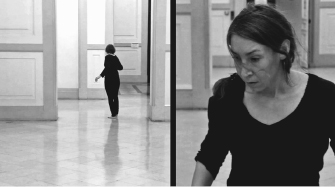 Figure 0.1 Still from the dance The Angel of Geostory, by Stphanie Ganachaud, filmed by Jonathan Michel, February 12, 2013.
Figure 0.1 Still from the dance The Angel of Geostory, by Stphanie Ganachaud, filmed by Jonathan Michel, February 12, 2013. I became convinced that this dance expressed the spirit of the times, that it summed up in a single situation, one very disturbing to me, the one the Moderns had first fled the archaic horror of the past and what they had to face today the emergence of an enigmatic figure, the source of a horror that was now in front of them rather than behind. I had first noted the emergence of this monster, half cyclone, half Leviathan, under an odd name: Cosmocolossus. The figure merged very quickly in my mind with another highly controversial figure that I had been thinking about as I read James Lovelock: the figure of Gaia. Now, I could no longer escape: I needed to understand what was coming at me in the harrowing form of a force that was at once mythical, scientific, political, and probably religious as well.
Since I knew nothing about dance, it took me several years to find, in Stphanie Ganachaud, the ideal interpreter of this brief movement. These lectures, reworked, expanded, and completely rewritten, are the basis for the present book.
If I retain the genre, style, and tone of the lectures in publishing them, it is because the anthropology of the Moderns that I have been pursuing for forty years turns out to resonate increasingly with what can be called the New Climate Regime. I use this term to summarize the present situation, in which the physical framework that the Moderns had taken for granted, the ground on which their history had always been played out, has become unstable. As if the dcor had gotten up on stage to share the drama with the actors. From this moment on, everything changes in the way stories are told, so much so that the political order now includes everything that previously belonged to nature a figure that, in an ongoing backlash effect, becomes an ever more undecipherable enigma.
For years, my colleagues and I tried to come to grips with this intrusion of nature and the sciences into politics; we developed a number of methods for following and even mapping ecological controversies. But all this specialized work never succeeded in shaking the certainties of those who continued to imagine a social world without objects set off against a natural world without humans and without scientists seeking to know that world. While we were trying to unravel some of the knots of epistemology and sociology, the whole edifice that had distributed the functions of these fields was falling to the ground or, rather, was falling, literally, back down to Earth. We were still discussing possible links between humans and nonhumans, while in the meantime scientists were inventing a multitude of ways to talk about the same thing, but on a completely different scale: the Anthropocene, the great acceleration, planetary limits, geohistory, tipping points, critical zones, all these astonishing terms that we shall encounter as we go along, terms that scientists had to invent in their attempt to understand this Earth that seems to react to our actions.
Next pageFont size:
Interval:
Bookmark:
Similar books «Facing Gaia: eight lectures on the new climate regime / Bruno Latour»
Look at similar books to Facing Gaia: eight lectures on the new climate regime / Bruno Latour. We have selected literature similar in name and meaning in the hope of providing readers with more options to find new, interesting, not yet read works.
Discussion, reviews of the book Facing Gaia: eight lectures on the new climate regime / Bruno Latour and just readers' own opinions. Leave your comments, write what you think about the work, its meaning or the main characters. Specify what exactly you liked and what you didn't like, and why you think so.

